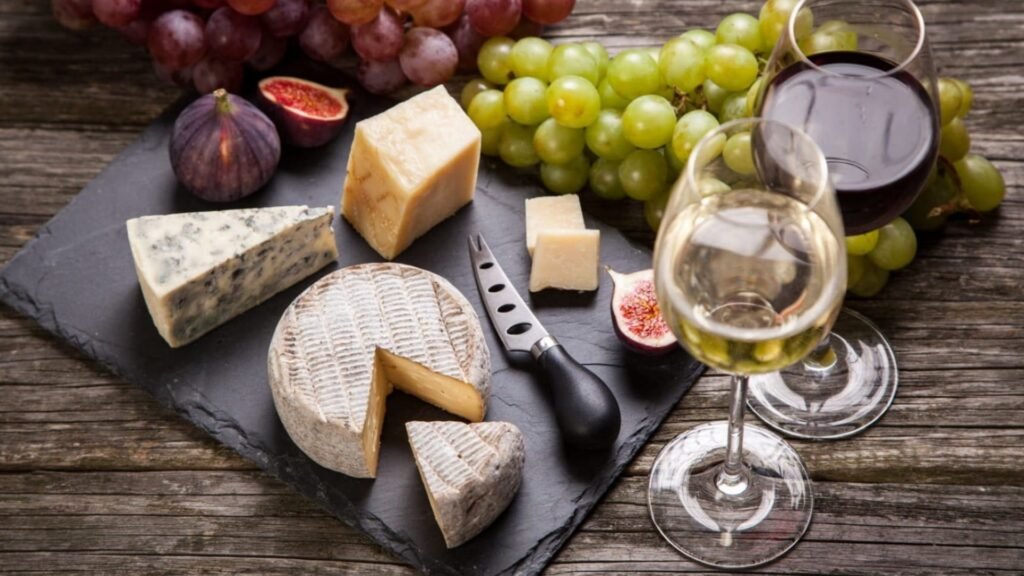Pairing wine with different types of cheese can elevate your dining experience to a whole new level. Whether you’re hosting a gathering or enjoying a quiet evening, knowing how to match wine with cheese can enhance the flavors and create a delightful balance. Let’s explore how you can perfectly pair wine with different types of cheese.
Understanding the Basics of Wine and Cheese Pairing
When pairing wine with different types of cheese, it’s important to consider the flavor profile of both the wine and the cheese. A good pairing complements the flavors of both the cheese and the wine, creating a harmonious balance. Let’s get into some fundamental principles of pairing wine with cheese.

Pairing Red Wine with Cheese
Red wine is versatile and pairs well with a variety of cheeses. Here’s how to match red wine with different types of cheese:
- Cheddar: Aged cheddar and red wine make a classic pair. The bold, sharp flavors of cheddar go well with robust reds like Cabernet Sauvignon or Merlot. These wines have the body and structure to stand up to cheddar’s strong taste.
- Gouda: Gouda, especially when aged, pairs nicely with a medium-bodied red wine like Pinot Noir. The wine’s fruity notes complement the caramelized flavors of the aged Gouda.
- Blue Cheese: For blue cheese, opt for a rich red wine like Port or Zinfandel. The sweetness in these wines balances the salty, tangy flavor of the blue cheese, creating a delightful contrast.
Pairing White Wine with Cheese
White wines can also create wonderful pairings with various cheeses. Here’s how to match white wine with different types of cheese:
- Brie: Brie is creamy and mild, making it a great match for a crisp white wine like Chardonnay. The wine’s acidity cuts through the richness of the cheese and enhances its flavor.
- Goat Cheese: Fresh goat cheese pairs beautifully with Sauvignon Blanc. The wine’s bright acidity and citrus notes complement the tangy flavor of the cheese, making for a refreshing combination.
- Gruyère: This Swiss cheese, known for its nutty flavor, pairs well with a white wine like Riesling. The wine’s sweetness balances the savory notes of Gruyère, providing a pleasing contrast.
Pairing Sparkling Wine with Cheese
Sparkling wine, with its effervescence and acidity, is a versatile choice for pairing with cheese. Here’s how to match sparkling wine with different types of cheese:
- Parmesan: Aged Parmesan pairs well with Champagne or Prosecco. The bubbles in the sparkling wine help cleanse the palate between bites of the salty, nutty cheese.
- Havarti: This semi-soft cheese works well with sparkling wines like Cava. The light, creamy texture of Havarti complements the effervescence of the wine, creating a balanced pairing.
- Ricotta: Ricotta cheese, with its delicate texture, pairs nicely with a sparkling wine like Brut. The light, refreshing quality of the sparkling wine enhances the mild flavor of the ricotta.
Pairing Cheese with Dessert Wine
Dessert wines are another excellent option for pairing with cheese. They can add a sweet, rich dimension to the tasting experience. Here’s how to match dessert wine with different types of cheese:
- Roquefort: This strong blue cheese pairs beautifully with Sauternes or other dessert wines. The sweetness of the wine complements the strong, tangy flavor of the Roquefort.
- Ricotta Cheesecake: For a creamy dessert like ricotta cheesecake, try pairing it with a late harvest Riesling. The wine’s sweetness enhances the richness of the cheesecake, making for a delightful finish.
Tips for Successful Pairings
- Balance Flavors: Aim for a balance between the strength of the cheese and the body of the wine. Strong cheeses need bold wines, while mild cheeses pair well with lighter wines.
- Consider Texture: Match the texture of the cheese with the wine. Creamy cheeses work well with wines that have good acidity, while harder cheeses go well with wines that have a robust flavor.
- Experiment: Don’t be afraid to try different combinations. Personal preference plays a significant role, so experimenting with various pairings can lead to delicious discoveries.
Conclusion
Pairing wine with different types of cheese can be both fun and rewarding. By understanding the flavor profiles and characteristics of both, you can create harmonious combinations that enhance the dining experience. Whether you prefer red, white, sparkling, or dessert wine, there’s a perfect cheese pairing waiting for you. Enjoy experimenting and finding your favorite matches!



